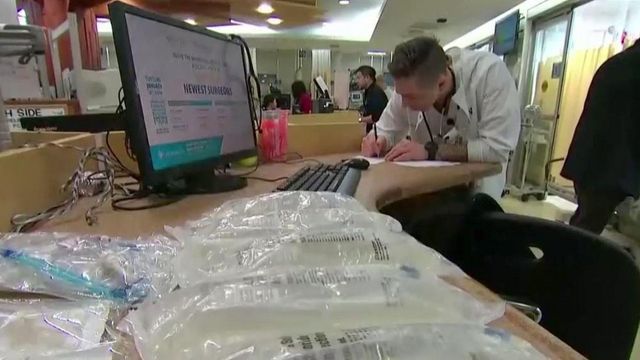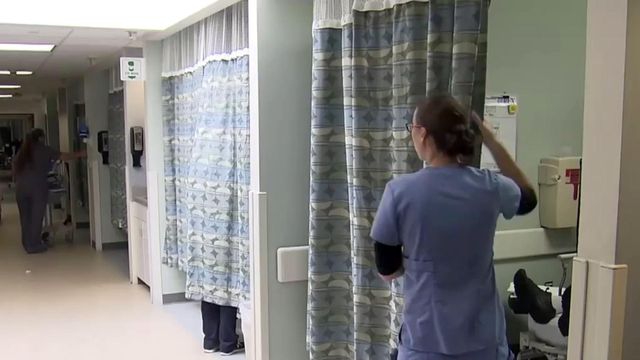Triangle hospitals grapple with IV bag shortage amid nasty flu season
The current flu season could end up as one of the worst in recent memory, an occurrence worsened by a national shortage of medical IV bags
Posted — UpdatedDr. Kuldip Patel, a pharmacy official at Duke University Hospital, told WRAL News Wednesday that there isn't a hospital in the country that isn't grappling with the medical supply shortage. He said at Duke, the hospital's allocation of IV bags have been reduced by half.
Patel said a team at Duke met to discuss the shortage.and to devise a solution. He said the team is looking at solutions where the hospital can use an alternative or, in some cases, completely eliminate the use of IV bags.
"We had to do something to reduce our usage by about 50% and move to another alternate means without impacting patient care and we've been able to do that successfully so far," he said.
The acute shortage of IV bags is linked to Hurricane Maria and the devastation it wrought on Puerto Rico last September.
Supplies of saline and nutrient solutions were already tight before hurricanes pounded Puerto Rico and cut power to manufacturing plants that make much of the U.S. supply of fluid-filled bags used to deliver sterile solutions to patients.
Flu season has turned out to be a bad one and it came early, bringing patients in need of fluids into hospitals already running low.
Hospital officials, pharmacists and other staff have been devising alternatives and workarounds, training doctors and nurses on new procedures and options, and hitting the phones to try to secure fluids from secondary suppliers.
“If we can’t support patients coming in emergency rooms who have the flu, more people are going to die,” predicts Deborah Pasko, director of medication safety and quality at the American Society of Health System Pharmacists, a professional group. “I see it as a crisis.”
The U.S. Food and Drug Administration said last week it believes shortages will start to ease over the next few weeks, but stressed “the production situation in Puerto Rico remains fragile.”
Puerto Rico’s power grid is being slowly restored and the last of three Baxter International factories there that make saline bags and nutrient solutions was reconnected just before Christmas. But intermittent power outages are still slowing Baxter’s efforts to get back to full production.
Only a few other companies make those solutions, and supplies never fully recovered after a 2014 shortage of saline bags.
Rex and WakeMed both responded via written statements to inquiries from WRAL News about how they're dealing with the shortage of IV bags.
"WakeMed has been fortunate to maintain a systemwide supply. As a health system, WakeMed has resources available across our facilities to manage the shortage without any disruption to patient care. In some cases, safe alternative forms of IV fluids and treatments are used when clinically appropriate. Our pharmacy and clinical care teams meet daily to track fluid inventory, coordinate distribution and ensure the needs of our patients are being met without compromising care. We also work closely with our suppliers, including Baxter, to effectively manage our supply. We will continue to serve our patients for the duration of this shortage – and the duration of this year’s flu season."
"UNC Health Care, along with most other hospitals nationwide, continues to face shortages of some medical supplies. Those challenges are being fueled by a variety of factors, including ongoing production issues in Puerto Rico. UNC Health Care has contingency plans in place, and teams of people working daily behind the scenes to find new sources for some supplies, implement conservation measures and use alternative medical products when possible. As UNC Health Care has expanded to 13 hospitals across the state, sharing information and resources across a larger system has helped us with various strategies that benefit a bigger population of patients. Our top goal is to treat all patients in a safe and appropriate manner, and our teams are doing their best to minimize any impact on our patients."
• Credits
Copyright 2024 by WRAL.com and the Associated Press. All rights reserved. This material may not be published, broadcast, rewritten or redistributed.






